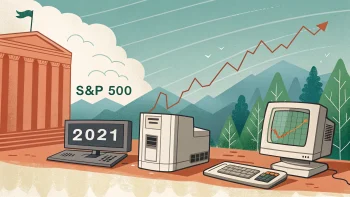Downsizing your life can seem radical in a world obsessed with consumption and keeping up with the Joneses. But what if I told you it could help you achieve financial success?
It’s true. A minimalist lifestyle can enable you to save significant amounts of money by shedding unnecessary possessions. You’ll also be on your way to a more fulfilling and secure future.
Table of Contents
ToggleThe Financial Burden of Clutter
Most of us have more possessions than we need. This includes clothes that never get worn, gadgets we never use, and furniture that takes up valuable space. As the late and great George Carlin once said, “That’s all your house is: a place to keep your stuff.” He even joked, “Sometimes you gotta move, gotta get a bigger house. Why? No room for your stuff anymore.”
Besides weighing down our minds, clutter drains our wallets in several ways:
- Storage costs. Clutter comes at a cost, whether you rent a storage unit, buy a bigger house, or simply pack things into overflowing closets. For example, the cost of a storage unit can range from $100 to $300 per month. However, according to Move.org, prices are mainly determined by size and availability.
- Maintenance and upkeep. The more stuff you own, the more you must maintain, clean, and repair. As a result, money and time are wasted.
- Impulse purchases. When possessions surround you, impulse purchases are easy to make, adding to the clutter and depleting your savings.
- Replacement costs. The more things you own, the more likely it is that something will break, get lost, or become outdated.
The Power of Simplifying
Downsizing your life is not just about getting rid of stuff. Instead, it’s about shifting your mindset. If you simplify your life, your finances will benefit significantly:
- Boost your savings rate. We all know that the less we spend, the more we save. Reducing unnecessary expenses can free up valuable cash flow for savings goals like retirement, vacations, or home down payments.
- Reduce debt. Have you ever felt you owned your possessions due to hefty monthly payments? You can break the cycle of debt by downsizing. Spending less on unnecessary expenses allows you to pay off debts faster, saving you interest.
- Smarter spending. When you simplify your life, you are more likely to spend mindfully. With quality over quantity, you’ll be able to make more meaningful purchases that will last a lifetime.
- Increase your financial security. Financial security doesn’t mean having everything; it means having enough to live comfortably and deal with unexpected challenges when they arise. The simpler your life, the more prepared you are for emergencies. Fewer expenses will give you more flexibility to handle unforeseen situations, such as job loss or medical bills.
- Invest for the future. Downsizing can save you money that can be invested strategically. If you invest in a diversified portfolio or contribute more to your retirement fund, you can plan for the future.
Simplifying Doesn’t Have to Mean Deprivation
The concept of downsizing doesn’t imply deprivation. With less, you can live a more prosperous life. These tips can help you simplify your life without depriving yourself:
- Don’t be afraid to declutter ruthlessly. Don’t keep items that don’t bring you joy, serve a purpose, or haven’t been used in a while. If you have unwanted items, consider selling them online or donating them to a charity.
- Embrace minimalism. Prioritize quality over quantity. Buy durable, well-made items that can serve multiple purposes and will last a long time.
- Prioritize experiences. Put your money into experiences that create lasting memories instead of accumulating possessions. Take time to travel, spend time with loved ones, or engage in a hobby you enjoy.
- Challenge consumerism. Avoid marketing ploys that lead you to believe you need the latest and greatest. Take time to think about your purchases and decide what is important to you.
The Ripple Effect of Simplifying
There are ripple effects beyond your finances when you simplify your life. In some cases, it can lead to:
- Reduced stress. Clutter can exacerbate stress. When you downsize, you’ll create a calmer, more organized living space, leading to more relaxation. Studies have linked disorganization and clutter to mental health conditions like depression, anxiety, and stress. You may feel frustrated, helpless, or overwhelmed when your environment is messy.
- Increased productivity. When less clutter distracts you, it will be easier for you to concentrate at home and work.
- Greater appreciation. Owning less can help you appreciate your possessions more. It will inspire you to find joy in the small things and cultivate a sense of gratitude.
- Environmental benefits. Using less and decluttering will help you live a more sustainable lifestyle and reduce your ecological impact.
Getting Started with Downsizing
Simplifying can initially seem daunting, but it doesn’t have to be complicated. The following tips will help you get started:
Conduct a spending audit.
Take a month to track your expenses to know where your money goes. By categorizing your spending, you can identify areas where you can reduce spending. Do you have any subscriptions you don’t use? Instead of eating out, can you brown-bag your lunch?
This might not sound like much. But remember, every little bit counts.
Declutter your living space.
Our environment significantly impacts our spending habits. When surrounded by clutter, we’re more prone to purchasing new things. Therefore, take the time to declutter your home.
Of course, this can be overwhelming at first. So, use these steps to get the ball rolling:
- Take small steps. You should set manageable, small goals. Focus on just one pile, closet, or room at a time.
- Get help from others. Family members, friends, or a paid consultant can help you make decisions.
- Snap a picture. Take a picture of an item you have difficulty parting with. A photograph can still create a connection with a sentimental object.
- Decide what to do with unwanted items. You can sell them online or at a garage sale. This will generate extra income while creating a more peaceful environment. Alternatively, you can schedule a drop-off or pick-up with local homeless shelters or donation centers.
Resist impulse purchases.
Occasionally, something shiny catches our eye and tempts us to splurge. However, think twice before you make an impulse purchase. And, always ask yourself, “Do I really need this, or do you I want it?
You should also implement a waiting period. Would it be possible to wait a week or a month before purchasing? In many cases, you save money because the desire fades.
Adhere to the “One-Year Rule.”
Before buying something new, try to remember if you have used a similar item within the last year. If you haven’t, you’re likely to not use the new item as well. Following this simple rule can curb impulse purchases and save money.
Challenge yourself.
Set a spending goal for yourself. Breaking the cycle of mindless consumption can be as simple as going without purchases for a weekend or a month. Remember that you do not have to keep up with the Joneses. You cannot find true happiness through material possessions but rather by aligning your life with your values.
The Road to Financial Freedom
It is important to remember that downsizing is a personal experience. Depending on who you are, what works for you might not work for someone else. Regardless, it’s important to find a balance that allows you to live comfortably and prioritize your financial well-being.
Simplifying your life can increase your savings and lead to a more rich, meaningful way of life. So, are you ready to embark on this journey?
FAQs
What is downsizing, and how can it benefit my finances?
By downsizing, you simplify your lifestyle and possibly reduce your living space. There are several financial benefits associated with this, including:
- Lower housing costs. It is possible to free up cash and reduce property taxes by selling a larger home for a smaller one.
- Reduced maintenance costs. You will spend less time and money cleaning, repairing, and maintaining less space.
- Lower utility bills. Smaller homes generally use less energy to heat and cool, which reduces utility bills.
- Increased savings potential. With fewer expenses, you can allocate more money to savings and investments.
How do I get started with downsizing?
- Eliminate clutter ruthlessly. Remove anything unused, broken, or no longer brings you joy from your possessions. If you have unwanted items, consider selling, donating, or recycling them.
- Evaluate your living space. Are you really in need of all that space? Would you be comfortable living in a smaller house or apartment?
- Research downsizing options. Consider different housing options based on your budget and needs. You might want to consider senior living communities or more minor, low-maintenance properties.
What are some additional benefits of downsizing besides financial?
- Less stress. When you have fewer belongings, you have less to clean, organize, and maintain, giving you more time and mental space.
- Simpler lifestyle. By downsizing, you emphasize relationships and experiences rather than material possessions.
- Increased mobility. Moving and exploring new opportunities can be easier when you live in a smaller space.
Is downsizing right for me?
There is no one-size-fits-all solution to downsizing. Think about your current lifestyle and your future plans. When you’re an empty nester, nearing retirement, or simply want a more manageable living situation, downsizing might be the right move for you.
If you have a large family or plan to expand soon, downsizing might not be a good choice.
Are there any downsides to downsizing?
Letting go of sentimental items can be emotionally challenging when downsizing. Additionally, you may have to adjust to a smaller living space and possibly a new neighborhood.
Image Credit: Jorge Urosa; Pexels

















